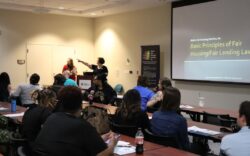Superior Court Judge J. Wade Padgett denied the request of community group Inner East Athens Neighbors to move the date of the special election to replace former commissioner Mariah Parker to Nov. 8. The special election to fill the vacated District 2 commission seat will remain on Mar. 21 as originally scheduled by the Athens-Clarke County Board of Elections.
Several District 2 voters officially joined Inner East Athens Neighbors in their lawsuit seeking to force the ACC Board of Elections to change the date of the special election. Their petition was heard by Padgett on Friday in a courtroom packed with supporters.
Cshanyse Allen, founder of Inner East Athens Neighbors, took the stand and urged the court not to allow District 2 to go without commission representation for six months. Although she does not currently live in the district, Allen lamented rising rents there and a number of property deals in the area which have forced many residents from their homes recently. She said that conditions will continue to deteriorate if the district is forced to go without representation until March. “We will lose our community in that time,” Allen said.
When the group’s attorney, Dexter Wimbish, made a similar comment, Padgett wondered aloud in reference to Parker, “isn’t that the fault of the person who abandoned her term before it was up [and not the Board of Elections]?”
Inner East Athens Neighbors’ complaint is with the ACC Board of Elections, not with Parker or the ACC Commission per se. Yet, Allen argued that Parker’s progressive allies on the commission, including Commissioner Melissa Link, were colluding behind the scenes to influence the Board of Elections and to deprive District 2 of representation, thereby securing political power for themselves.
Since the Republican-controlled state legislature dramatically changed Athens’ commission districts earlier this year, regularly scheduled commission elections in May used the new district lines which will go into effect in January. However, when Parker resigned they left a vacancy in the old District 2. That means that if the special election was held in November, eligible voters would be determined using the old district lines, an important technicality.
Link, who lives in the new District 2, has announced that she intends to run for Parker’s vacated seat. Allen and other petitioners rightly pointed out during the hearing that this means Link has a personal interest in having the special election in March, when she would be eligible to run, rather than in November, when she would not be eligible. Those who view Link as a political ally would also have the same special interest in the election being held in March rather than November.
However, this still does not mean the ACC Board of Elections made their decision because of a special interest held by some progressive commissioners, rather than based on their primary interest of holding well-run elections and serving ACC voters in an impartial way. The rest of the hearing centered around whether the ACC Board of Elections decided appropriately, based on their primary interest, or inappropriately, based on the special interest Allen claims that they had.
Georgia law holds that special elections can only be held in conjunction with general elections such as the one on Nov. 8 if they are called at least 90 days before election day. Parker officially resigned on Sept. 7, which was 62 days before the general election. That means the special election to replace Parker could not legally be held on Nov. 8 in conjunction with the general election, simply due to the timing involved.
In this case, if the special election were held on Nov. 8 as petitioners requested, it would have to be held “separate and apart” from the general election to be in compliance with Georgia law. That means it would have a separate ballot, it would be conducted on separate polling machines in a separate line with separate poll workers from the general election.
When ACC Elections Director Charlotte Sosebee took the stand, she said that her office did not have enough polling machines to carry out a “separate and apart” election, requiring her to borrow them from another county. She also testified that she did not have the necessary poll workers, who would have to be recruited and trained in a short time frame. Finally, she said that her office did not even have the list of voters who would be eligible to vote in such an election in their possession. According to Sosebee, this voter list was destroyed during the process of updating the Georgia Secretary of State’s computer system to use the new ACC Commission Districts. Before holding an election using the old district lines, the old voter list would have to be recreated from GIS data, a time-consuming process. Furthermore, candidates would have to step up and qualify for the election quickly over a period of two and a half days, a very short time frame.
Due to the rush that would be necessary to hold an election on such an accelerated schedule, Sosebee testified that it would be possible for a candidate, who lives in the old District 2 but not the new District 2, to qualify for the office and win in November, only to be disqualified in January when the district lines change. In this case, Sosebee explained that yet another special election would need to be held, which would presumably take place in March. Given the small overlap between the old and new District 2, this hypothetical would not be a remote possibility, but may in fact be somewhat likely.
In his final decision released today, Padgett wrote that the previously mentioned issues would cause undue difficulty for the ACC Board of Elections if he were to force them to hold the special election in November. Even more persuasive to him were the “very legitimate concerns relating to voter education” and potential confusion voters might face with not one but two lines on election day for different elections. For District 2 voters in particular, Padgett wrote that “there is a very real danger of misinformation and confusion.”
Because of this potential for voter confusion, Padgett decided that the ACC Board of Elections did not abuse their discretion in deciding to hold the special election in March due to a special interest. Rather, he found that they made their decision using “a just and proper exercise of discretion to ensure a fair and just election.”
In any case, the plaintiffs’ claims were moot because there are only 29 days left until the general election scheduled for Nov. 8. Georgia law requires that elections are called at least 29 days before election day, which includes running a notice in the community’s paper of record (i.e. the Athens-Banner Herald), which does not publish on Mondays or Tuesdays. That means Padgett could not have required the election to be held in November, no matter what he ultimately decided, simply due to time constraints.
Allen had already indicated during public comment at the Oct. 4 mayor and commission meeting that if her lawsuit failed, which it now has, that she would ask Gov. Brian Kemp to appoint a commissioner for District 2 immediately, overriding the typical democratic process.
Padgett shut down this idea during the hearing, saying that there is “no possibility under which Governor Kemp could have made the appointment.” According to the ACC Charter, Section 2-106(b), a special election must be held to replace a vacancy on the commission.
“If the term of the vacant commission position will continue for more than one hundred eighty (180) days, a special election shall be held as provided in this Charter and in general state law to elect a new member of the commission to serve for the remainder of the term.”
Some of the confusion stems from an ACC government announcement that the special election was to be held on Nov. 8. However, Sosebee testified that the election was never scheduled for Nov. 8, and that the announcement was made by the ACC Public Information Office in error. Only the Board of Elections may officially call for an election; the Public Information Office has no authority to do so.
During the hearing, Sosebee and the ACC Board of Elections were represented by Greg Sowell and ACC Attorney Judd Drake. Other witnesses called by Wimbish on behalf of Inner East Athens Neighbors included Commissioner Ovita Thornton and ACC Board of Elections member Willa Fambrough. In addition to Sosebee, Sowell also called Michael Barnes, director of election services for the Georgia secretary of state’s office, as a witness.
Padgett presides in the Columbia Judicial Circuit, not the Western Judicial Circuit that includes Athens. Padgett was called in to hear the case because all judges in the Western Judicial Circuit were disqualified according to Georgia law.
Like what you just read? Support Flagpole by making a donation today. Every dollar you give helps fund our ongoing mission to provide Athens with quality, independent journalism.










